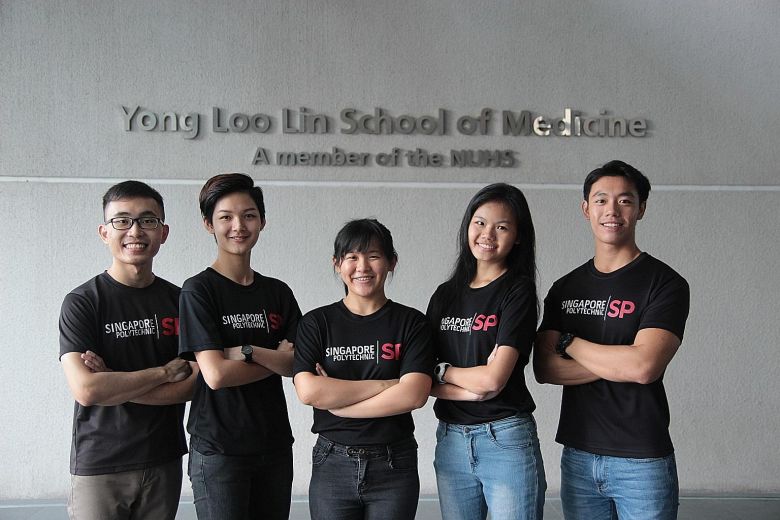The local universities are gradually accepting more polytechnic graduates into their medicine courses.
At least 11 of them scored places this year in the medical schools of the National University of Singapore (NUS) and the Nanyang Technological University (NTU).
These numbers have grown since NUS’ Yong Loo Lin School of Medicine took in its first two polytechnic graduates 10 years ago.
Of those accepted this year, six are from Singapore Polytechnic (SP) – the highest number from a single polytechnic to be accepted for the local medicine degree courses.
Five of them are enrolled in NUS’ Yong Loo Lin School of Medicine and one went to NTU’s Lee Kong Chian School of Medicine.
The NUS and NTU medicine courses are for undergraduates, while Duke-NUS Medical School takes in students with at least an undergraduate degree in any field except medicine.
Ms Mah Mon Moey, SP’s deputy director for the School of Chemical and Life Sciences, told The Straits Times that it “does not design courses specifically for medical school”, adding, however, that “our curricula and learning experience lend themselves well to those applying to medical school”.
Since 2010, SP has produced 27 graduates – many of whom read biomedical sciences – who enrolled in medicine degree courses locally.
Besides the five SP students, NUS’ medical school also accepted three graduates from Ngee Ann Polytechnic (NP), and one each from Republic Polytechnic (RP) and Nanyang Polytechnic (NYP).
To date, at least 13 NP graduates, another four each from RP and Temasek Polytechnic, and another three from NYP, have studied medicine locally.
The medicine courses at NUS and NTU admit about 300 and 120 students respectively a year, with the majority coming from junior colleges. Between 11 per cent and 15 per cent of applicants make it to medical schools here.
Ms Mah said that SP’s biomedical science and biotechnology courses cover topics such as monitoring and managing diseases, research in diagnostics and cure, and the production of pharmaceuticals.
Students learn knowledge and skills that “form a good foundation for a career in the biomedical science, pharmaceutical and healthcare sectors”, she said.
Polytechnic graduates said they knew it would not be easy to enter medical school. SP biotechnology graduate Peh Ting Yong’s application to study medicine at NUS in 2015 was rejected.
His time as a combat medic during national service, however, made him more certain that he wanted to be a doctor, so he applied again this year, and was successful.
“As a first-aider, I came across patients with severe bleeding, allergic reactions, spinal injuries, for instance… I wanted to learn more to know what to do in these situations,” said the 23-year-old.
SP biomedical science graduate Kimberley Lim said that when she chose to enrol in the polytechnic, she knew her chances of getting into medical school would be “way slimmer”.
With an O-level score of six, she was more than qualified to study in a junior college, but she wanted to pursue her interest in the healthcare sector.
“The A levels would be too general… My poly course exposed me to a lot of modules such as immunology, basic anatomy and biochemistry,” said the 20-year-old who will read medicine at NUS this month. “Of course medicine will be more in-depth, but I feel like I’ve had a small introduction to it.”
Article & Photo from Straits Times


